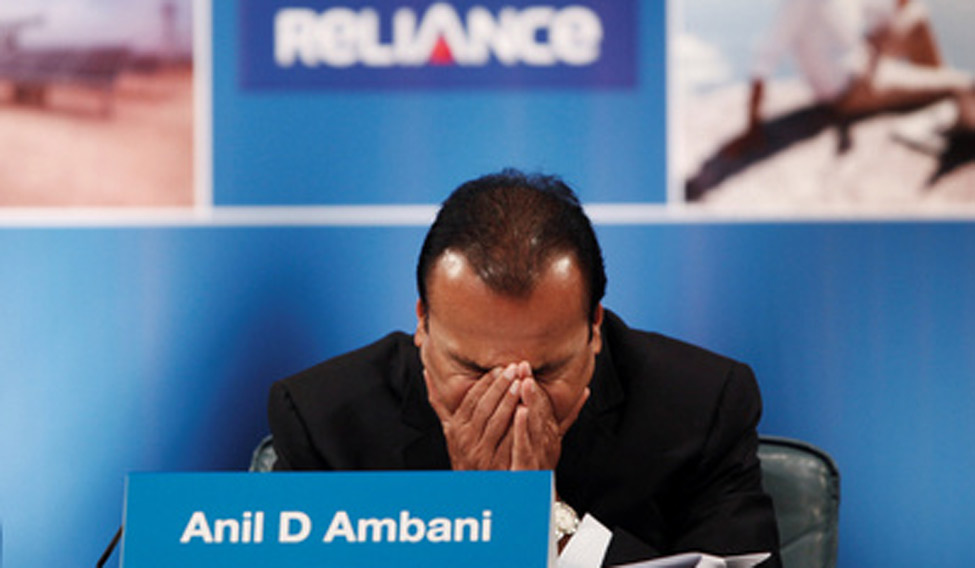The price war sparked by the entry of Mukesh Ambani-led Reliance Jio is hitting incumbent telecom players hard. On Monday, shares of Reliance Communications (Rcom) plunged near 21 per cent to Rs 20.50, after the company, owned by Mukesh Ambani's younger brother Anil Ambani, reported a loss for the quarter and full year.
Other listed telecom companies were also under pressure, with Idea Cellular falling 0.7 per cent and Bharti Airtel down 0.2 per cent, even as the wider BSE Sensex rose 81 points or 0.3 per cent to a fresh high of 31,109.28.
For the quarter ended March 2017, Rcom reported a consolidated loss of Rs 966 crore, versus a profit of Rs 90 crore in the year ago quarter. Quarterly revenue also slumped 24 per cent to Rs 4,524 crore.
For the full 2016-17 financial year, Rcom posted a net loss of Rs 1,403 crore against a profit of Rs 639 crore a year ago, while revenue declined 11 per cent to Rs 19,949 crore.
The losses come on the back of huge price war in India's telecom industry, fuelled by the entry of Reliance Jio, which offered free services till March 31. While the company has started charging customers, its plans are still very competitive (three months unlimited plan at Rs 309 for Jio Prime customers), forcing others, including Rcom, to slash their prices.
Rcom is also offering unlimited voice calls from plans starting Rs 299. Its average revenue per user (ARPU) has declined to Rs 141 from Rs 157.
In a detailed quarterly report filed on Monday, Rcom reported cash flows from operations turned negative in the fourth quarter and its net debt stood at Rs 44,345 crore at the end of March, which has also got the marketmen worried.
“For the first time in over 20 years, the telecom sector registered de-growth in revenues, sharp drop in operating margins, accompanied by increased interest costs arising from a staggering industry debt burden, and higher depreciation and amortisation charges as a result of higher spectrum purchase costs,” it said.
The price war has also hit other telecom companies.
Bharti Airtel, so far the country's largest mobile services provider, reported a 72 per cent decline in fourth quarter net profit at Rs 373 crore, while revenue fell 12 per cent to Rs 21,935 crore.
Aditya Birla Group-owned Idea Cellular posted a loss of Rs 328 crore in the January-March quarter versus a year ago profit of Rs 452 crore. Fourth quarter revenue fell 14 per cent to Rs 8,195 crore.
“The Indian wireless industry witnessed an unprecedented disruption in the second half of financial year 2016-17 on account of free voice and mobile data promotions by the new entrant in the sector. The October to April 2017 interval can be best described as ‘Period of Telecom Discontinuity’, permanently changing mobility business parameters,” said Idea.
The Jio-led disruption has forced incumbents to consolidate or sell non-core assets. Idea and bigger rival Vodafone have proposed a merger. Airtel acquired smaller rival Telenor's India business.
Rcom, which was struggling with mounting debt, even before the Jio launched, had launched a restructuring two years ago, when it announced plans to merge Russian Sistema's Indian wireless operations. With all approvals received, the merger is expected to be completed in June 2017, Rcom said.
Rcom is also merging its wireless business with Aircel, which will see overall debt reduce by Rs 14,000 crore as it will be transferred to the merged entity.
Analysts say, despite the pressure on earnings, the price war is unlikely to abate any time soon.
“The price war for data subscribers has dented the bottom lines of wireless telecom service providers, yet none of them is likely to pull a punch. If anything, competition will only heat up further, given that market leadership is all-crucial to the business,” said ratings agency CRISIL.
In the past one year, overall data traffic has surged five times, but 4G data prices have slumped 60 per cent, since Reliance Jio launched in September 2017.
The adjusted gross revenues of incumbent telecom operators is only expected to grow about 0-5 per cent this financial year, but the profitability picture is “grimmer,” said CRISIL.
“Aggregate EBITDA margins of the industry (ex-Jio) is expected to drop further by 50-100 basis points. That’s over and above 600 bps drop to 29 per cent estimated for last fiscal,” it said.
Analysts at broking firm Motilal Oswal also expect some more pain for the telecom industry over the next two to three quarters, with earnings only recovering gradually from third or fourth quarter.
“We expect industry to bottom in next three-four quarters,” they said.






